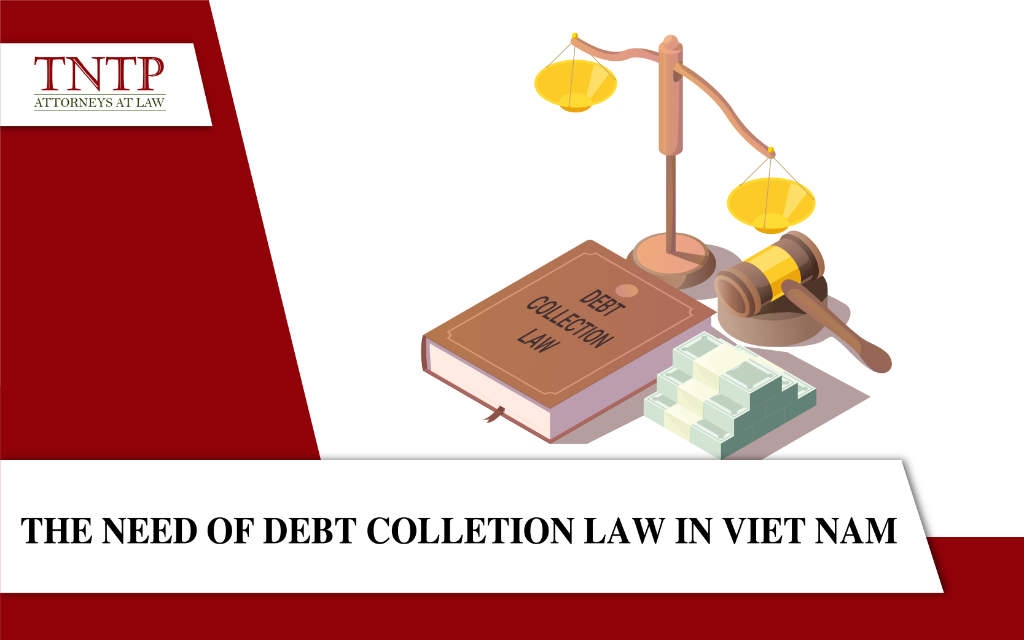In daily life or domestic and international business activities, debts always appear. However, debts are not always paid on time. The outstanding debts will become bad debts and stagnate the activities of the lender, which slows down the cash flow and affects the economy. To avoid that, debt collection activities were born, the debt collector represents the entitled party to arbitrarily apply its measures to force the debtor to pay the debt. However, because collecting debt freely is prone to distortions and illegal acts, the Investment Law 2020 has banned debt collection services in Vietnam. Is this ban reasonable? Instead of banning this activity, should it be regulated by a specific law? To answer the above legal questions, this article will point out the need for Debt collection Law in Vietnam.
1. Debt collection Law is a trend in developed countries
Looking around the world, it can be seen that the current global trend is to allow and control debt collection instead of banning it. In many developed countries, governments have legalized and strictly controlled debt collection activities, for example, time limits, number of calls to debtors per day, prohibition of insulting, and infringing upon the honor and dignity of the debtor. If they don’t comply properly, debt collectors may be sued by debtors.
In Vietnam, the Investment Law 2020 has gone against this trend. Specifically, in Article 6 of the Investment Law 2020, the debt collection service has been banned due to the negative consequences that this profession has caused for many years. Debtors were called dozens of times from early morning until late at night, their personal information was publicized, their honor and dignity were insulted, “gangsters” came to their residence, threatened to use violence and destruction of property, etc. However, is it the right direction if debt collection service is banned? Is the occurrence of negative consequences caused by the legalized debt collection service or by the lax control policy of the competent authorities?
Since the Investment Law 2020 took effect, cases of law violations related to debt collection still have continued to occur. Instead of a complete ban, our country can bring debt collection back to the business and control it with a tighter legal barrier, namely the Debt Collection Law. Developed countries have done it and still control it well, so why can’t Vietnam?
2. Advantages of debt collection
The majority of people believe that debt collection service is dangerous because debt collectors often distort this activity, leading to extremist, violent, and illegal behaviors. However, this service is not always so negative. In terms of benefits, debt collection is more effective than creditors asking the debtor to pay the debt.
Creditors often hesitate to initiate a lawsuit in Court because of the long time and complicated procedures. Understanding this mentality, debtors often procrastinate and avoid paying the debt because there is no competent authority to force them to do that. At this time, experienced and professional debt collection organizations will take appropriate measures to put pressure on debtors to pay the debt. If there is a law on debt collection, the measures applied will not violate the law but still have good results in debt collection for the entitled party.
3. Reducing pressure on the Judiciary
In recent years, mediation activities have been focused on developing with the aim of reducing pressure on judicial agencies such as Courts, Procuracies, and Judgment enforcement agencies. However, conciliation is not easy when two parties conflict with each other. Mediation agencies still lack the knowledge of law regulations and have difficulties in finding appropriate solutions for debt collection. Instead, the debt collection service organization understands this field well so it will be easier to advise on debt settlement solutions without going to the litigation stage.
In addition, if the conciliation is conducted through the mediation agencies, the debt collection still carries the risk that debtors are not required to comply with the previous agreement, nor does the mediation agency have the authority to urge and monitor the performance of the debtor’s commitment. Thus, in the end, it is still necessary for the debt collector to stand out to help the entitled party closely monitor the payment process of the debtor. In this case, the Debt collection Law can clearly stipulate the duties of the debt collection organization in helping the parties to mediate and urging the debtor to fulfill its commitment.
Everyone wants the most effective and fastest debt collection. But the participation of the Judiciary is not enough. Therefore, Vietnam needs a Debt collection Law to legalize debt collection services. Who is allowed to do business in debt collection services? Individuals or legal entities? What is the subject and scope of debt collection? What activities are allowed? What behaviors are prohibited? Time and number of times to call, contact the debtor? Rights and obligations of related parties and state agencies in managing, inspecting, and sanctioning illegal debt collection activities? Can violations in debt collection lead to criminal prosecution? As long as the Debt collection Law has strict and reasonable regulations, it will bring great value to both society and the economy of Vietnam.
Best regards
- For additional information and the newest articles from TNTP and Associates International Law Firm, please join our Facebook Fanpages at:
- Please click on the following link to learn more about legal knowledge:
https://dsdc.com.vn/en/category/legal-newsletter/
- Please click on the following links to learn more about the legal services of TNTP and Associates International Law Firm:
- Dispute resolutionservices: https://dsdc.com.vn/en/the-dispute-resolution-services-from-tntp-law-firm/
- Legal consultingservices: https://dsdc.com.vn/en/legal-consulting-services-from-tntp/
- Debt collection services: https://dsdc.com.vn/en/debt-collection-services-from-tntp/
- For additional information, please contact us at:
TNTP and Associates International Law Firm
Lawyer Nguyen Thanh Ha
Phone: 0931 798 818
Email: ha.nguyen@tntplaw.com







